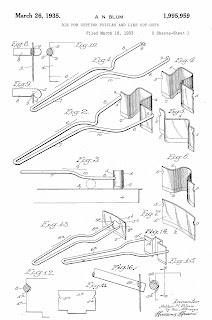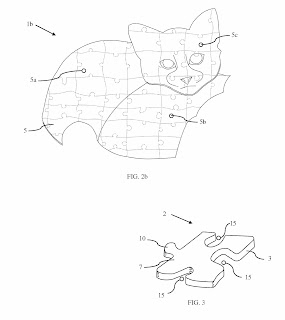Actually, this would more appropriately be called patents for puzzles, but I can't resist a good title.
Recently, a jigsaw puzzle was placed in Fondren's staff lounge, and it got me thinking about puzzle IP. Were jigsaw puzzles ever patentable? If not the puzzles, then perhaps their production or manufacture, or even a process for assembling a puzzle, has been patented.
As it turns out, there are a lot of patents for various aspects of jigsaw puzzles, dating back to the early 20th century (according to my results). I found most interesting those patents for early jigsaw puzzle production, such as 1935's patent no. 1,995,959, Die for Cutting Puzzles and Like Cut-Outs.
 |
It still looks like a laborious process
|
There were also a lot of inventions concerned with preserving puzzle progress or a completed construction. I found three early versions most useful, starting with 1933's
patent no. 1,904,724, Jig-Saw Puzzle Holder, with adjustable dimensions for different puzzles sizes.
 |
Simple, yet an effective solution for those wobbly edges
|
Later that year,
patent no. 2,003,845, Adjustable Frame for Jigsaw Puzzles, provides a different structure for the framing as well as a surface with increased friction to keep pieces from sliding apart.
Years later, in 1950, patent no. 2,506,189, Adjustable Jigsaw Puzzle Frame, takes various levels of ability into concern, and incorporates an element that elevates and angles the puzzle. Inventor R.B. Attridge had in mind those who might struggle otherwise, stating in the second sentence that "Solving of jig saw puzzles affords a wholesome pastime for invalids and convalescents, for example, for disabled veterans". Props to Attridge for some early accessibility design thinking! For those who may think 1950 isn't that early, consider when the ADA was passed.
 |
A frame with added elevation and angle properties, for accessibility
|
Later, the puzzle patents become more concerned with adapting puzzles to new purposes and environments. For example,
patent no. 5,536,009, Pool Puzzle, Method of Play, which is a floating puzzle meant to be assembled in the pool. I can't say I've much considered swimming and puzzle assembly compatible activities, but perhaps that's why I'm not an inventor like fellow Texan Scott D. Edwards. Then again, I also spent countless hours when younger reading hardback books while in a pool, which is almost as incompatible a pairing.
 |
Unfortunately, it looks like a very simple puzzle
|
Many of the most recent reflect a trend in spatially expanding puzzles. For example, Thomas and Jean Greenwald own patents for two three dimensional puzzles. First, in 2021,
patent no. 11,198,056, Multiple Level Jigsaw Puzzle, and in 2023,
patent no. 11,717,745, Tier-on-Tier Multiple Level Jigsaw Puzzle.
 |
I didn't pick this one because it was kitty-shaped, really
|
I started to think about whether the puzzle aide I owned was patented. It wouldn't have appeared among the results for my above search [query: ((jigsaw
OR (jig
WITH saw))
AND puzzle)
AND (cardboard
OR wood)]. Take a look at the pictures, and shout out some suggested search terms in the comments!
 |
It's a large rectangular piece of felt and an inflatable cylinder
|
 |
Mine has been rolled up in a closet for too long
|
 |
The felt piece rolls around the inflatable cylinder and has two elastic stays, held together with Velcro
|








No comments:
Post a Comment